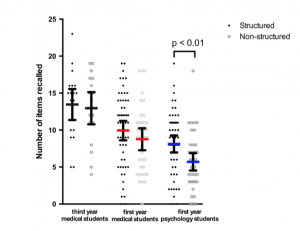We have a new paper out that reports a study on how physician’s structuring of information during discharge events (i.e., when patients are about to leave the hospital after diagnosis and treatment) may improve patients’ recall of medical information (title, abstract, and reference below).
The study tested Psychology and Medicine students’ memory for information provided in a simulated discharge event (i.e., students watched a video of a physician talking to a patient about to be discharged from the emergency department after a possible heart attack). As can be seen in the figure below, the results suggest that providing an overview of the content of the discharge beforehand, and structuring the communication accordingly, improves memory mostly for lay individuals (i.e., psychology students) but not so much for experts (i.e., third-year medicine students).

The work suggests that physician-patient communication can benefit from information structuring but it leaves unanswered whether such knowledge can actually be used to improve patients’ recall and medical decision-making in real settings. We are currently running a randomised control trial that answers this question by testing the effectiveness of training physicians to structure their communication (vs. training physicians to be more empathetic) in a collaboration between the Emergency and Psychosomatic Medicine Departments of the University Hospital Basel and the Faculty of Psychology (Basel Discharge Communication Project).
Information structuring improves recall of emergency discharge information: A randomized clinical trial
This article examines the extent to which structuring Emergency Department discharge information improves the ability to recall that information, and whether such benefits interact with relevant prior knowledge. Using three samples of students with different levels of prior medical knowledge, we investigated the amount of information recalled after structured vs. non-structured presentation of information. Across all student samples, the structured discharge information led to a relative increase in recalled items of 17% compared to non-structured discharge information (M = 9.70, SD = 4.96 vs. M = 8.31, SD = 4.93). In the sample with least medical knowledge, however, the structured discharge information resulted in a relative increase in recall by 42% (M = 8.12 vs. M = 5.71). These results suggest that structuring discharge information can be a useful tool to improve recall of information and is likely to be most beneficial for patient populations with lower levels of medical knowledge.
Be the first to leave a comment. Don’t be shy.